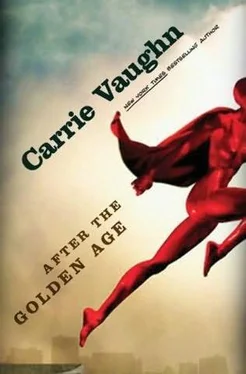Halfway through the next morning, her doorbell rang. She flinched to wakefulness and looked at the clock: ten. Sunshine filled the living room. She wanted it to be night again, to get the day over with.
If she stayed quiet, whoever it was would go away. Some kid selling magazine subscriptions or a charity looking for donations. She didn’t want to deal with it.
Then the thought burst upon her like a migraine.
— Celia, it’s me. Open the door. —
Arthur Mentis. Couldn’t hide from him.
She looked at her unshowered self, ratty pajamas and all, wondered if she ought to tell him she needed to change clothes. On the other hand, he could read her mind; what did it matter what she was wearing? Running her fingers through her unkempt hair, she reached the door, opened it, and moved aside to let him in. He studied her, his brow raised, and remained standing in the doorway, hands shoved in the pockets of his trench coat.
“If you don’t want me here, I can leave,” he said.
She sighed. “If you were anyone else I’d never have opened the door in the first place. Come in.”
He did, and she closed the door after him. He said, “You weren’t at the courthouse yesterday. I tried calling you to check on you, but there wasn’t an answer.”
“Worried I was getting in trouble?”
“Just worried,” he said.
“I had my phone, I would have gotten your call— Wait.” The cell phone was still lying on the floor. She retrieved it, checked the display, hit a couple buttons. “I think it’s broken. I threw it.”
“Did it make you feel better?”
“Not really.”
“I see you’re not at work.”
“I thought everyone would have heard by now. I’ve been fired. Well, not fired. But almost.”
“I see. That’s hardly fair.”
“That’s what I thought. And Mark isn’t speaking to me. That’s why I threw the phone.”
“So when I ask, ‘How are you?’ the answer is, ‘Not good.’”
“I’m fine.” She said this through gritted teeth.
“Right. Is there anything I can do?”
She could scream and throw him out. But he was only trying to be nice. It was hard having him around when she didn’t want to talk about it. With him, she didn’t have to talk about it. He just knew , and while that was often convenient when she was trying to explain things to her parents, she didn’t need that now.
“I’ll be okay. I’ll let you know if I need anything.”
He started to turn, then hesitated. “What’s your plan B?”
“Plan B?”
“I don’t expect you to stay at home moping.”
“What do you expect me to do? My career is ruined. No one will hire me to pick up trash after this. My friends aren’t speaking to me. Maybe I can find a nice dry hole to bury myself in.” She rubbed her face, which was warm and flushed. “If I haven’t made up for what I did by now, what hope is there? Maybe I should just go be a criminal mastermind myself. Prove everyone right.”
“I know you don’t mean that.” And he did, because he could see it in her mind.
She probably wouldn’t make a very good criminal mastermind, either.
“Plan B, huh? What do you recommend?”
He shrugged. “Maybe stop trying to prove to everyone you’ve reformed, and just do what you think is right.”
“The old ‘ignore them’ ploy? How often does that work?”
“Just because everyone else is looking backward doesn’t mean you have to. Call me if you need anything.” He closed the door behind him on his way out.
Do what’s right, she thought. Maybe that was part of the problem—she was having trouble locating right, at the moment. Her gut was tied up in too many knots right now for her to listen to it.
If she had to work this hard to prove that she had worth, that she wasn’t a bad person, maybe that said something about her. If she really were good, she wouldn’t have to work so hard. In the end, she hadn’t left the Destructor’s clutches of her own free will. The only reason she hadn’t stayed with him was because he’d abandoned her. Not because, deep down, she was good.
She’d been seventeen and out of her mind. Dr. Mentis said so.
She was still out of her mind.
At any rate, if she wanted more ice cream, she was going to have to leave the apartment.
She considered it a supreme act of will that she managed to put on real clothes and walk herself to the convenience store down the street to pick up ice cream and frozen burritos. Protein—she’d need her strength if she was going to keep eating all that ice cream. In her scruffy state—unbrushed hair, jeans, and a rumpled sweatshirt—she didn’t at all resemble the photos from the courtroom that some of the newspapers still had splashed on their front pages, so no one recognized her to give her any trouble.
The headline on The Commerce Eye drew her attention. That was what it was designed to do, bordered in red and filling the entire page. It didn’t matter how outrageous it was; if it screamed loud enough everyone would have to listen.
“Is the Destructor Controlling Crime Spree from Prison? Mayor Vows to Beef Up Police!”
The recent robberies cum kidnappings—even the Baxter Gang episode, which had the same MO—had all been planned by the same person. It didn’t follow that person had to be Simon Sito. But he’d been responsible for most of the crime sprees of the last twenty years. People had trouble pointing the finger in a different direction.
She couldn’t get away from the belief that Sito wasn’t responsible. If the press and general rumor kept talking about Sito, they deflected attention from who was really doing this.
It occurred to her that just because she didn’t have her job didn’t mean she couldn’t work.
She had real food for lunch and saved the ice cream for later. Microwaved burrito in hand, she fired up her computer.
She approached the problem as if it had been presented to her as part of her job. How do you hide unique, expensive assets? If she were studying the books of someone selling such assets illegally, what would she look for? High-dollar money transfers without claiming assets or deducting depreciation. Someone spending money with nothing overt and legal to show for it.
The Destructor wasn’t spending anything; the DA had had all his assets frozen. All the ones they could find, at least. If Sito were smart—and he was, no question there—he wouldn’t touch his hidden assets just yet; he wouldn’t risk revealing their location. But if he did, would he be buying up unique and priceless cultural artifacts? Or paying someone to do steal them?
It wasn’t his MO. He was the Destructor for a reason. He liked blowing things up, taking them apart, and disintegrating them, not collecting them.
Cultural artifacts. That was the pattern. She got online to search the city’s events calendar. What else out there would interest a thief who’d already taken rare violins and prize koi?
There it was: The Commerce City History Museum was hosting a philately exhibition: rare stamps, one-of-a-kind printings, unique and priceless to the right collector. The exhibit opened Saturday.
She had to leave the apartment again to replace her cell phone—then hesitated, because she didn’t know who to call first. Her parents, came the first impulse. The Olympiad would want to know. They’d be able to stop the theft. They’d even be likely to listen to her. The cops, not so much. Even so, she ought to call them as well. Mark, maybe. The chance of Mark listening to her was microscopic right now. Same with Analise.
Hell, maybe she should call everybody. Then maybe at least one of them would believe her and do something about it.
She called Suzanne’s cell. The voice mail picked up.
Читать дальше












